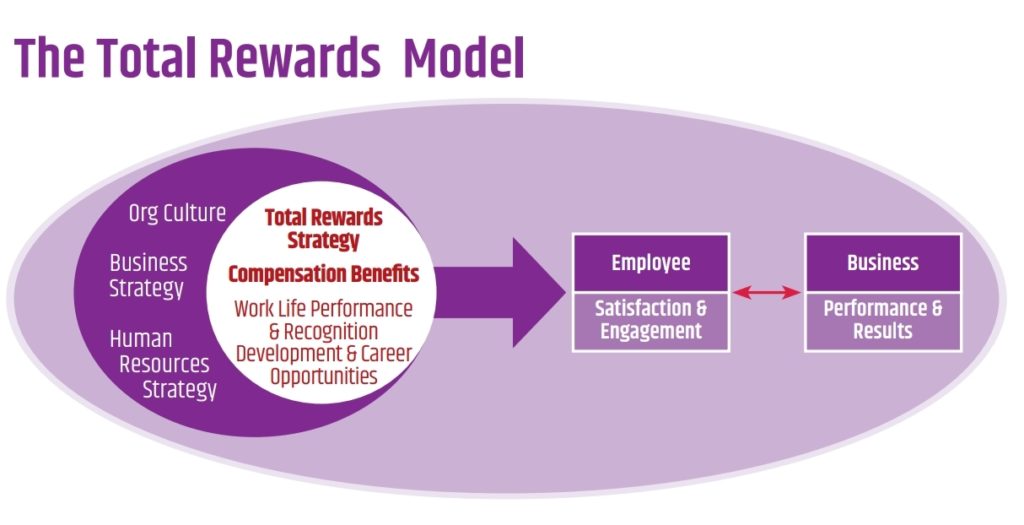Total rewards in today’s context and in its modern avatar is a bouquet comprising of Compensation, Employee Benefits, Environment, Career Development, Performance & Recognition. There are multiple pieces of research that indicate a strong and visible impact of an effective ‘Total Rewards Strategy” on enhancing performance and employee engagement, thus leading to better business performance and results. Today “Rewards” is an integral part of the people strategy for any organization and has gained significant importance when it comes to attraction, motivation, and retention of talent.

As a rewards leader, when we are planning the rewards strategy, the following few elements need to be kept in mind. An effective Rewards strategy is an interplay between the four elements of four factors like External competitiveness, Financial consideration, Talent strategy & employee preference.

Some of the elements which need to be considered are the market positioning, internal priorities, desired pay mix, performance linkage, compensation systems along with the communication approach, which is key. The leadership team in business are looking at rewards for
- Strategic & effective linkage to business
- Governance mechanism
- The relevance of offerings for employees
- Execution focus through HR Shared Services
- Differentiation in performance, skill & competency and lastly
- To communicate the Total Rewards effectively
In today’s era of global competition, each organization is trying to make its mark on the global footprint and that creates a lot of pressure on its people. It is imperative that as part of the people strategy, we can attract, motivate and retain talent who would help in achieving the organizational objectives and for that the reward strategy should be driving the overall management philosophies and objectives.
“Today is an era of a multi-generational workforce, one of the biggest challenges which come for rewards is keeping everyone engaged and keeping them motivated. Today is a world of choice and flexibilities, everyone needs that choice in their personal as well as professional lives. The ways of working are seemingly different when it comes to various age groups in the company who are working together. The “motivators” are also different for a Gen X, millennials and Gen Z”
Another challenge that we foresee in the future is that employees may not want to be employees connected with just one organization in the long run. They would prefer to be associated with multiple companies and would like to change when it comes to the type of work opportunity provided. Constant learning is a must for Gen Y and even for other employees and they may want to be associated only for a few months/years before shifting to another company which provides them another opportunity for learning. How do we build contracts to cater to such a workforce? What kind of terms and conditions can be done which gives flexibility to employees? How does remote working play and at the same time keep everyone motivated while they work from their respective homes? These are questions and challenges which many organizations are challenged with, from a rewards standpoint.
How does one formulate the policies and processes which suit the needs of everyone and can help them to be connected to an organization not only rationally but even emotionally? That’s a big question before every company. Moreover, the way it looks like, people may just want to be “volunteers” when it comes to some specific work/projects, etc.
To manage the above challenge and have a winning rewards strategy, companies need to have their employees chose the rewards which works best for them and which derives the maximum value to them. The Total Rewards offer should link the value it holds for the employee and for the employer who is making that investment for the employee.
Some of the elements which we strongly feel as our Rewards Value Proposition are:
- Flexibility is Key – Be it their compensation or benefits, companies are starting to perform conjoint analysis as to what components do employees want. Not only in providing a Flexi- basket pay but also in co-creation of benefits. Benefits policies co-designed with the help of employees has a far more uptake of the program along with helping in enhancing employee engagement. Flexibility would be an attractive differentiator with respect to becoming an employer of choice.
- Differentiation & Segmentation – Differentiation is key when it comes to bringing up a high performing organization. The motivation for high performers would come in only when they see a differential with respect to other employees. Be it incentives or base pay, differentiation really drives better performance amongst employees. Also, segmenting the benefits and policies basis the age, interest, groups help in the better uptake of the programs and creates traction towards the company. Different plans for different segments help in the retention of talents.
- Use of Data Analytics – Today, the use of data analytics is extremely important in rewards. Various analytics and dashboards help in driving the right judgment amongst the managers and amongst the rewards community. The correct judgment of any decision is extremely crucial and hence the tools and automation help the organizations to make informed decisions. The above two points related to differentiation, segmentation, and flexibility can be very well analyzed with the help of data analytics tools and systems.
- Communication, Communication & Communication – This is vital for any organization. As much as the company provides its rewards offer, employees still need to be communicated effectively across all components of pay and benefits, for them to register it completely in their minds and it also helps them to use it in a meaningful way. Regular communication in a creative way is important for spreading awareness amongst employees and for enhancing the utilization of any benefits program.
- The Wellbeing of Employees – For any rewards offer, the Wellbeing of employees is vital and unless and until these aspects are well taken care of, organizations would not be having a happy, healthy and contented set of employees. By Wellbeing, we should focus on all the four aspects of Wellbeing, which are Physical WB, Mental WB, Emotional WB & Social WB. In Schneider Electric, we say that “Wellbeing creates performance and performance generates Wellbeing”. People’s expectations are changing, and well-being becomes a key differentiating & attractiveness factor for the future. We need to find energizing ways of working, leading to sustainable engagement. Alongside, Well-being has a strong impact at 3 levels. The first one in terms of People engagement which deals with Health, Stress, Retention issues, Collaboration, and high performance. The second place where it has its impact is in terms of Customer Satisfaction wherein employees may have innovative ideas, are growth-centric and would make their customers happy. The third critical area would be the Company’s performance in terms of Brand image, empowerment & trust. Wellbeing helps the company in achieving its objectives in all the above three areas.
As a summary, I would like to say that with the changing times, it’s important that the rewards winning strategy should be linked to the needs and aspirations of a multi-generational workforce, which needs to be co-curated by employees and co-implemented too. Rewards offering should have elements of flexibility within it, should be communicated widely and lastly look at the wellbeing of its employees, who in turn would make the organization reach its potential and make it a successful one in the long run!









